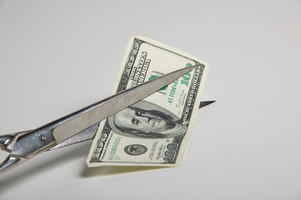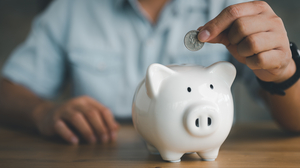Let’s Talk Money – National Financial Awareness Day
If I’m being honest, I’m not the most financially savvy person. When it comes to budgeting, saving, and investing, I tend to feel a bit overwhelmed. And I know I can’t be the only one. That’s why I thought National Financial Awareness Day would be perfect to round up some easy tips and tricks to help us all, myself included, to be a little bit better with our money.
Money – An Uncomfortable Topic
There’s no question that many couples admit that money and finances are a big topic that can cause disagreements. But in general, money can be uncomfortable to talk about with any one. We don’t discuss our paychecks with our peers. And if you’re like me, you’d be slightly embarrassed if someone was looking over your shoulder when you open the bank app to see how much money you have (or don’t have).
Even for people living comfortably on their income, inflation is starting to affect them as well. It seems more and more people are looking for ways to save at the grocery store, the gas pump, and more. Any time I see tips on ways to save, I’m definitely going to check it out.
National Financial Awareness Day – August 14th
National Financial Awareness Day is celebrated on August 14th, though the origins of the holiday are unknown. Regardless, it’s a great time to step back and analyze your finances and maybe even set some goals. But honestly, you don’t need a set day to do this.
Maybe you’re living paycheck to paycheck. Or maybe you’d like to save up for a vacation or retirement. Whatever your situation, being aware of your current financial status is a big part of developing better money habits.
Some times it feels like as long as the bills are paid, we’re good. But what if you do want more? It’s time to take inventory and see what changes you can make to start saving for your future.
Tips For Financial Awareness
There is no shortage of information when it comes to financial awareness. A quick Google search will provide a plethora of resources. Here are just a few to get you started:
Budgeting. You knew this was going to be up first. It’s a great place to start. But budgeting doesn’t have to be a bad word. It’s all in how you approach it. This is a time to get honest with yourself about the money coming in and the money going out. There are many apps and spreadsheets available for free online to get you started! Quicken has some simple tips to help you set a budget that sticks. A big thing to remember when analyzing your budget, what are your essential needs, and what is simply a want or luxury.

Managing Expenses. When it comes to your money, managing it is of course part of your budget. But remember, there will be unexpected expenses, inflation, changes with your income. You have to learn to manage within your means to hopefully stop you from living paycheck to paycheck. Quicken offers some ways to help here.
Savings. Building your savings is an important part of your financial status. And when it comes to how much you should be saving, you’ll hear varying opinions. For example, Dave Ramsey and the Budgetnista both recommend the 50/30/20 rule. This means you use 50 percent of your income for essentials (needs), 30 percent for discretionary spending (wants), and 20 percent for savings. This could be a little difficult to start, if you’re already using more than 50 percent for your essentials. But with some time, focus, and maybe some additional income, you can still get there!
Set No Spend Days/Month. I’ve seen some people online who have a lot of success with a no spend month. Basically, it’s a month where you don’t spend any money other than the necessities (bills, gas, etc.). For a less extreme version, you could simply dedicate a day each week where you don’t do any unnecessary spending.
Cut Back Where You Can. For some people, it’s cutting the cord and getting rid of cable television. Are there subscriptions you aren’t using that you can cancel? Are there adjustments with your home energy usage that you can make to save on your electric bill? Adjusting your thermostat can impact your bill each month.
If dining out is costing you a lot of money, is there a way you can cut back but not completely restrict yourself? Maybe dining out only a select number of times each month, or opting to drink water versus alcoholic beverages when you’re out. Instead of dining out for lunch at work, opt for packing your lunch each day which can save you a lot in the long run.
And when it comes to shopping, there are many ways to save. If the purchase isn’t something you need, wait a few days before pulling the trigger on the purchase. With time, you might realize you don’t really need it after all.
Also, many grocery stores have loyalty programs to help you save along with weekly deals. Some even have digital coupons now, where you don’t have to cut them out. I know I’ve saved more money when I shop at Food Lion versus buying my groceries at Walmart.

Additional Income or Savings. When it comes to ways to bring in additional income, there are limitless ideas. Some of these simply involve apps you can download on your phone. There are a variety of apps that can help you score cash back or points to redeem for cash from your store purchases and dining. There are also many survey apps that you can earn cash with.
And if picking up a side hustle is more your style, there are many opportunities from handyman type projects, dog walking, babysitting, etc. If you have a certain skillset, there are many online sites for freelancers too.
A Few More Financial Tips
Forbes shares 31 creative ways to save money. Here are a few worth noting:
- Shop at discount or bulk stores – like Aldi and Costco.
- Buy generic brands.
- Stick to a list when shopping.
- Unplug electronics when not in use – chargers, game consoles, TVs, etc.
- Tweak the thermostat – adjust 7 to 10 degrees for eight hours each day.
- Open a high-yield savings account – this is one I’ve heard quite a bit, but know nothing about really.
Financial Awareness In Summary
Financial awareness might not be a topic you want to think about too much, but if you’re wanting to change your spending habits, it’s something you’ll have to face at some point. Being responsible with your finances can help you achieve the goals you set for yourself and set you up to live a bit more comfortably.
And again, you don’t have to wait until National Financial Awareness Day to analyze your spending habits. Maybe it’s something you set aside a day every 6 months or so to see how you’re progressing. And don’t feel like you’re in this alone. There are many of us looking for ways to improve. There are so many resources for financial awareness online… and thankfully, most of them are free!

